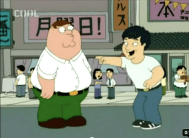A big thanks and respect to all those who have recently submitted a comment or question, especially in regards to the next book, Modern Japan—decoded! I have written this short commentary in response to the two most popular questions I’ve received: (1) Why did you leave the US and move to Japan? And (2) What is the new book about?
In the late 1990s, following the tragic killings of Hip Hop icons, Tupac and  Biggiehqdefault I realized racism was not getting any better; i.e. it was not going away. Nothing illustrated this fact more succinctly than the music/entertainment industry. Looking back, it’s embarrassing to think I actually believed segments of the “Thug Life” and “Junior Mafia” performances were real. Behind all their lyrics about smokin’ burners, flippin’ keys, and stackin’ chips was (and still is) nothing more than musically-inclined actors with expensive props. Witnessing the cultural demise of Hip Hop was the straw that broke the camel’s back; so I left the US. Why Japan? Well, for me, since I was leaving my father’s homeland it was natural to return to my mother’s. In addition, having already traveled to South and Central America as well as the Caribbean, I knew that many of the lands occupied by my people were firmly under the rule of white supremacy; but, at that time, I foolishly believed that moving to Japan would put me beyond its borders.
Biggiehqdefault I realized racism was not getting any better; i.e. it was not going away. Nothing illustrated this fact more succinctly than the music/entertainment industry. Looking back, it’s embarrassing to think I actually believed segments of the “Thug Life” and “Junior Mafia” performances were real. Behind all their lyrics about smokin’ burners, flippin’ keys, and stackin’ chips was (and still is) nothing more than musically-inclined actors with expensive props. Witnessing the cultural demise of Hip Hop was the straw that broke the camel’s back; so I left the US. Why Japan? Well, for me, since I was leaving my father’s homeland it was natural to return to my mother’s. In addition, having already traveled to South and Central America as well as the Caribbean, I knew that many of the lands occupied by my people were firmly under the rule of white supremacy; but, at that time, I foolishly believed that moving to Japan would put me beyond its borders.
For the first couple years, I was taken in by the novelty of clean, crime-free streets and a smooth, quiet public-transportation system. These attributes are welcoming beacons for anyone accustomed to the pollution in Philly  and NYC—not to mention the lack ofjapanese crying customer-service generally associated with a commute on SEPTA or MTA. However, unbeknownst to many who faun at the order, cleanliness, and safety in big cities like Tokyo and Osaka is the hyper-inflated level of mental illness also present in their midst. The Japanese proverb, “The nail that sticks out gets hammered down,” sheds light on the mental and psychological dumbing-down of its citizens; in other words, their psychosis molds them into a nation of modern-day serfs.
and NYC—not to mention the lack ofjapanese crying customer-service generally associated with a commute on SEPTA or MTA. However, unbeknownst to many who faun at the order, cleanliness, and safety in big cities like Tokyo and Osaka is the hyper-inflated level of mental illness also present in their midst. The Japanese proverb, “The nail that sticks out gets hammered down,” sheds light on the mental and psychological dumbing-down of its citizens; in other words, their psychosis molds them into a nation of modern-day serfs.
The Good News
Unlike in the US, where the laws and police target us, the limits in Japanese society have been set to keep its own citizens in line—not black folks. So am I saying that original people don’t experience discrimination? Of course not. Analogous to how US society is built on racism (i.e. years of free labor and lynchings in the past / biased laws and police shootings in the present), the very foundation of Japanese society is discrimination, itself. In fact, the society cannot exist without discrimination, which means that Japanese people are constantly searching to identify and stigmatize the ‘cultural other.’ This dynamic is occurring even if there are no foreigners present. Why is this good news? Because Japanese have been programmed to discriminate against “gaijin”—again, not black folks. fatgaijin As long as you don’t  accept the label/role of ‘gaijin,’ believe it or not, their discriminatory practices aren’t aimed at you. Many people—especially blacks—have no idea that ‘gaijin’ was a term created for European missionaries, traders, and pirates—not you. However, nowadays, black people’s level of self-hatred is at such an all-time high that many of us are flattered to be categorized with whites—even if the name of the category is ‘barbarian’ or ‘savage.’ So, how do we avoid being treated like a ‘gaijin’? Well, it’s takes more than just declaring, “I’m not a gaijin!” But, on the other hand, it’s just as simple. This concept and much more will be explored in Modern Japan—decoded!
accept the label/role of ‘gaijin,’ believe it or not, their discriminatory practices aren’t aimed at you. Many people—especially blacks—have no idea that ‘gaijin’ was a term created for European missionaries, traders, and pirates—not you. However, nowadays, black people’s level of self-hatred is at such an all-time high that many of us are flattered to be categorized with whites—even if the name of the category is ‘barbarian’ or ‘savage.’ So, how do we avoid being treated like a ‘gaijin’? Well, it’s takes more than just declaring, “I’m not a gaijin!” But, on the other hand, it’s just as simple. This concept and much more will be explored in Modern Japan—decoded!

Please submit any/all questions regarding living in Japan to: takuanamaru@gmail.com. Thank you!
Takuan Amaru is the author of the trilogy, Gaikokjin- The Story.

